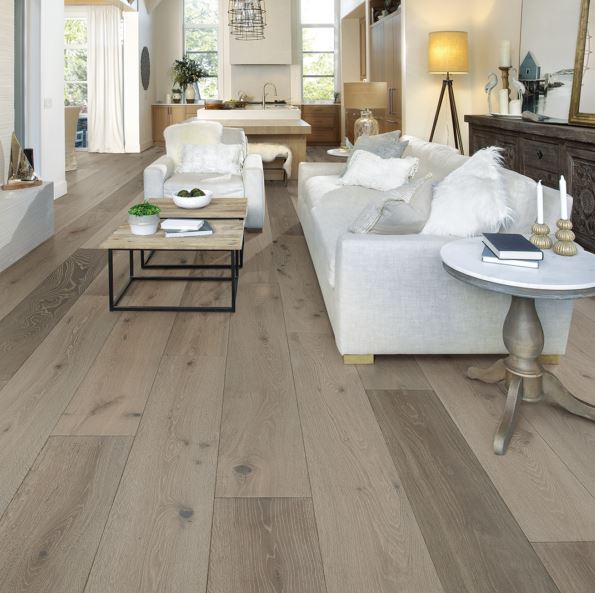When choosing flooring for your home, wooden floors are a top choice for their timeless beauty, durability, and warmth. However, homeowners often face a dilemma: Should they choose solid hardwood or engineered wood flooring Dubai Both options have unique benefits and drawbacks, making it essential to understand their differences before deciding. In this guide, we’ll explore hardwood and engineered wood flooring, comparing them in terms of durability, aesthetics, cost, maintenance, and suitability for different spaces.
Understanding Hardwood and Engineered Wood Flooring
What is Hardwood Flooring?
Hardwood flooring is made from solid wood planks milled from a single piece of timber. Popular wood species include oak, maple, cherry, walnut, and hickory. The planks typically come in various widths and thicknesses, and they can be sanded and refinished multiple times over their lifespan.
Pros of Hardwood Flooring:
Long-lasting and durable
Can be refinished multiple times
Adds significant value to a home
Natural aesthetic with unique grain patterns
Cons of Hardwood Flooring:
Susceptible to moisture and temperature changes
Can be expensive
Requires periodic refinishing
Prone to scratches and dents
What is Engineered Wood Flooring?
Engineered wood flooring consists of a top layer of real hardwood veneer bonded to multiple layers of plywood or high-density fiberboard (HDF). This structure enhances stability and resistance to moisture, making it an excellent alternative to solid hardwood in certain environments.
Pros of Engineered Wood Flooring:
More resistant to moisture and temperature changes
Less prone to warping and expanding
Easier and faster to install
Can mimic the look of solid hardwood
Cons of Engineered Wood Flooring:
Limited refinishing options (depends on veneer thickness)
May not add as much resale value as solid hardwood
Some lower-quality versions may wear out faster
Comparing Hardwood and Engineered Wood Flooring
Durability and Longevity
Hardwood flooring is known for its exceptional durability. With proper care, solid hardwood floors can last for 50 to 100 years or more. They can be sanded and refinished multiple times, allowing homeowners to restore their floors when they become scratched or worn.
Engineered wood flooring, while durable, typically lasts 20 to 30 years depending on the thickness of the top veneer layer. If the veneer is thick enough (3mm or more), it can be refinished once or twice, but thinner veneers (less than 2mm) may not allow refinishing at all.
Winner: Hardwood flooring for longevity; engineered wood for stability in humid environments.
Aesthetics and Appearance
Both hardwood and engineered wood flooring offer a natural, elegant appearance. Since engineered wood features a real hardwood top layer, it looks almost identical to solid hardwood. However, the main difference lies in customization: hardwood allows for staining and refinishing in various colors and finishes, while engineered wood’s finish is often pre-determined at the time of purchase.
Winner: Hardwood flooring for greater customization; engineered wood for pre-finished convenience.
Cost Considerations
Budget plays a significant role in flooring choices. Solid hardwood flooring is typically more expensive, ranging from $8 to $15 per square foot, including materials and installation. Exotic wood species may cost even more.
Engineered wood flooring is usually more affordable, with costs ranging from $4 to $10 per square foot. The price varies based on wood species, veneer thickness, and quality of the core layers.
Winner: Engineered wood flooring for budget-conscious homeowners.
Installation Process
Hardwood flooring installation requires nailing or stapling planks to a subfloor, making it a time-consuming and often labor-intensive process best handled by professionals.
Engineered wood flooring offers easier installation methods, such as floating floors, glue-down, or click-lock systems, making it a better choice for DIY enthusiasts or quicker home renovations.
Winner: Engineered wood flooring for easier and faster installation.
Moisture Resistance and Suitability for Different Rooms
Hardwood flooring is highly sensitive to humidity and moisture, making it unsuitable for basements, kitchens, or bathrooms. It can expand and contract with temperature fluctuations, leading to gaps or warping.
Engineered wood flooring, with its layered structure, provides better resistance to moisture and is more stable in humid environments. It can be installed in basements, kitchens, and areas with fluctuating humidity levels without significant issues.
Winner: Engineered wood flooring for moisture-prone areas; hardwood for dry spaces.
Maintenance and Care
Both flooring types require regular sweeping and occasional mopping to maintain their beauty. However, hardwood floors may need more frequent refinishing and careful cleaning to avoid water damage.
Engineered wood flooring is easier to maintain due to its factory-applied protective finish, making it a better option for homes with pets, children, or heavy foot traffic.
Winner: Engineered wood flooring for low-maintenance upkeep.
Which Flooring is Right for You?
Choosing between hardwood and engineered wood flooring depends on your specific needs:
Choose Hardwood Flooring If: You want a long-term investment, the ability to refinish multiple times, and a natural, customizable aesthetic.
Choose Engineered Wood Flooring If: You need a budget-friendly option, moisture resistance, and an easier installation process.
Final Verdict
Both hardwood and engineered flooring Dubai are excellent choices, offering beauty, warmth, and durability. If you prioritize longevity and resale value, hardwood flooring is the ideal choice. However, if you want affordability, ease of installation, and moisture resistance, engineered wood flooring is the way to go.
Ultimately, the right choice comes down to your budget, home environment, and personal preferences. No matter which option you choose, wooden flooring will always add elegance and value to your space


